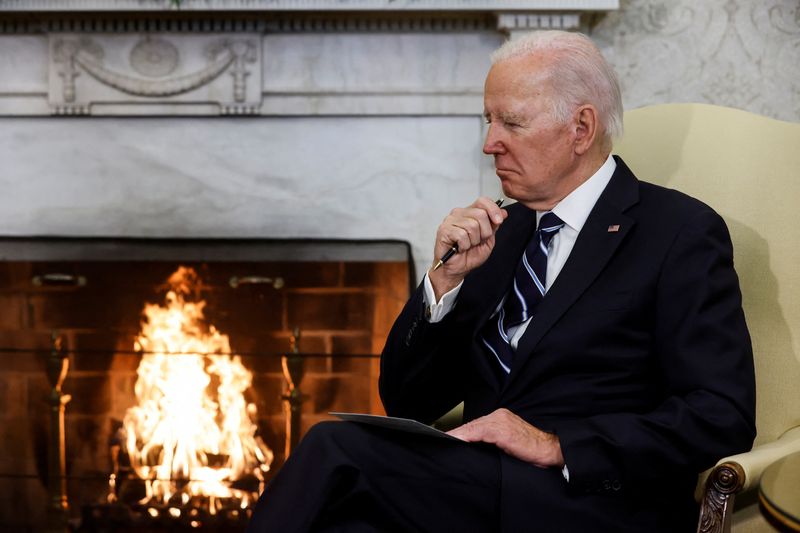By Richard Cowan
WASHINGTON (Reuters) - President Joe Biden is set to deliver his annual State of the Union address to the U.S. Congress on Feb. 7, venturing into the House of Representatives chamber following its takeover by Republicans who have vowed to challenge his legislative agenda and mount multiple investigations of him and his administration.
House Speaker Kevin McCarthy on Friday extended the invitation, which promptly was accepted by the White House.
"The American people sent us to Washington to deliver a new direction for the country, to find common ground and to debate their priorities," McCarthy wrote in a letter to Biden.
The annual address offers the Democratic president an opportunity to lay out his legislative goals midway through his four-year term and possibly tease out broader themes for an expected 2024 re-election bid.
It also gives Biden a national audience and thus an opportunity to shore up support among Democrats, some of whom are concerned about his age and other issues. Biden turned 80 in November and, if re-elected, would be 82 at the start of a second term.
The announcement of the speech came a day after U.S. Attorney General Merrick Garland announced the appointment of a special counsel to investigate Biden's handling of classified documents.
Biden's second State of the Union address will be held, as is the custom, in the House chamber, where Republicans last week took control after winning a slim majority in November's midterm elections. The new political landscape will make it more difficult for Biden to secure bipartisan deals on legislation that he likely will call for in his speech. Still, issues such as combating the opioid epidemic could draw broad support.
Biden also is likely to tout his administration's accomplishments over the past year including enactment of an infrastructure bill and the Inflation Reduction Act, with its climate change and prescription drug elements.
Biden will face a rambunctious and splintered gathering of Republican lawmakers eager to put their conservative mark on U.S. policy following four consecutive years of Democratic control of the House. With a razor-thin majority and intraparty divisions, Republicans had a historically difficult time electing a speaker and are expected to continue to struggle to unite their far-right and more moderate members on legislation.
Nonetheless, the House under McCarthy's leadership is expected to launch a major budget-cutting initiative with a particular eye toward reining in the cost of the Social Security and Medicare retirement and healthcare programs. House Republicans also are poised to pursue various investigations involving the president, his family and administration.
Biden and Senate Majority Leader Chuck Schumer, also a Democrat, have pledged to stop such legislation if passed by the House, as well as measures to restrict abortions nationwide.
Other matters that Congress could address in 2023 include legislation expected to be needed midyear to raise the federal government's borrowing authority, or debt limit. And then there are new gun control steps that Democrats hope would build on a modest bipartisan law enacted last year. Both parties also aim to address immigration policy following decades of failed attempts.

Conservative House Republicans are showcasing legislation to undo beefed-up funding for the Internal Revenue Service so that it can hire more agents to clamp down on wealthy tax cheats.
Biden is fresh off a trip to the U.S.-Mexican border, where the influx of immigrants has Republicans eager to legislate tougher security measures. Some congressional Democrats have expressed a willingness to trade new border controls for granting a pathway to citizenship for certain people brought illegally into the United States when they were minors.